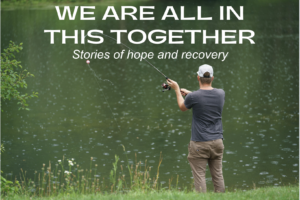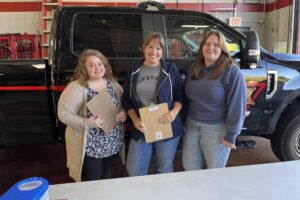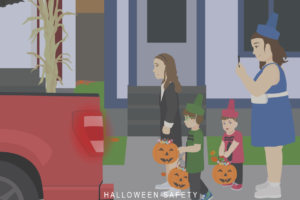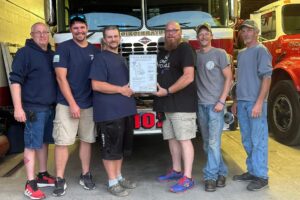Partner Spotlight: Prevention Network’s Family Support Program
Ashley Dailey, pictured below, is a Family Support Navigator with Prevention Network of Central New York. Prevention Network of CNY is a prevention center in Syracuse that provides healthy alternatives to substance use in the community. We spoke with Ashley to learn more about the Family Support Program, which is available to Cortland County residents.

Prevention Network offers family support, advocacy, and education to families impacted by substance use disorder. Their goal is to promote different outlets so that people make better choices so they can live a healthy life.
Can you tell us about the Family Support Program?
“The program I work under, the Family Support Program, has the goal to provide families with what they need, not what we think they need. Maybe they’re financially struggling and are really low on food. In that case, we would connect them to a food pantry. Based on their needs, we can connect them to treatment, ongoing individual support, educate about coping skills, setting boundaries, etc.”
Although Ashley is primarily based in Syracuse, she covers a # county region. Her goal is to first connect people with resources that already exist in their community. “We don’t want to take away from any of the already existing resources in Cortland (or whatever county the person is coming from), we just want to add support,” emphasized Ashley.
A lot of families have loved ones that go to receive treatment in Syracuse and will reach out looking for other resources in the area. As Ashley discussed, it is very nerve-wracking for a lot of families who are in a situation they never thought they would be in, so Ashley, or their other Family Support Navigator, Audrey, can help them while providing no judgment.
Can you share a bit more about your services?
“Our services are super customized, so I’m not going to tell someone what they need. I’m going to give someone the information they’re asking for. If you call a 1-800 number or treatment providers, that can be very overwhelming in an already chaotic situation. I try to assess what they’ve tried, what’s worked, what hasn’t worked, and together we come up with a very individualized plan based on their specific needs. So when they have this list of numbers, it’s not a packet of all the numbers of treatment providers- it’s contacts of people I know and have spoken to, and these contacts are then expecting a call. I can say hey, ‘Chris is going to come to you, this is what he’s going through, he’s going to call.’ Then when Chris calls, this contact is expecting him and ready to support him, and he feels very supported and comfortable.”
The program does awareness and advocacy on a large scale by involving the families and giving them a voice, if they want that. “It’s really whatever the family, or individual needs to help them heal,” Ashley said. For example, every year Prevention Network hosts a remembrance tree lighting, where families can have their lost loved one’s name placed on the tree on Overdose Awareness Day. Others can volunteer or help plan so they have an outlet for some of the pain they’ve experienced. Pictured below are the shoes of lost loved ones that were lined up on Syracuse’s City Hall front steps by family members on a previous Overdose Awareness Day Event.

Why was the Family Support Program created?
According to Ashley, “The Family Support Program exists because families are largely left out- that’s where I come in and can offer support. Our service is available at any point in the addiction journey. We also offer grief support- if someone loses somebody we can provide support for them.”
Who can be involved in the Family Support Program?
“Anybody can come to us. They can be an individual seeking treatment for themselves, and be struggling to connect with their family. It can be an entire family. I have people who have lost many friends to overdose and are experiencing survivor’s guilt. We have no limits to who we will help. An individual member from the family can come to us in private, families can come to us together, anything works.”
What opportunities exist?
There are opportunities for client creativity and starting something new that helps with grief/family relationships. Sometimes a family member will come to me with a great idea they want to make happen, and I get to help them, support them, and work with them to make this idea happen.
Dean O’Gorman is a great example. He came to me after he lost his son to overdose, expressing the lack of a parent grief group. I helped him start a parent grief group in Cortland County. If there’s a need that doesn’t exist in the community, we can help support the creation of it.”
In what form do clients meet with you? In person, zoom, etc…?
“People can meet via zoom, phone call, in person, communicate only through email- it is whatever the person needs. Coming in person might be too intimidating, so email might be better for people. Whatever people are comfortable with, I am totally fine with.
On top of this, Ashley mentioned that there is no insurance involved– it is free and confidential regardless of if you have no money, or if you’re a millionaire.
“There’s still a ton of work to be done, but I am so glad to be regularly serving clients in Cortland and want to continue to do so,” Ashley concluded with.
There are two full time Family Support Navigators, Ashley Dailey and Audrey Hopkins. You can reach them at their emails, adailey@preventionnetworkcny.org and ahopkins@preventionnetworkcny.org
Find more information about the Family Support Program, here: https://www.preventionnetworkcny.org/programs-services/family-support/






